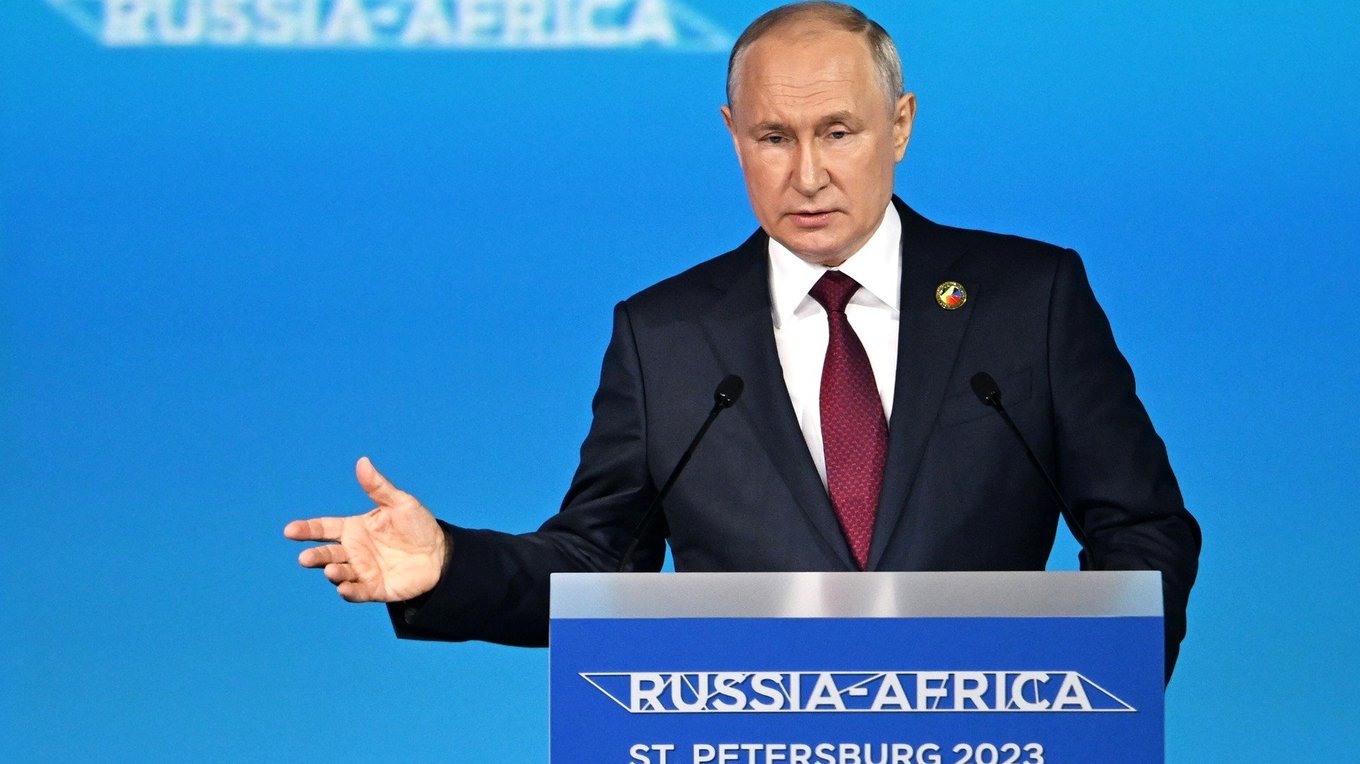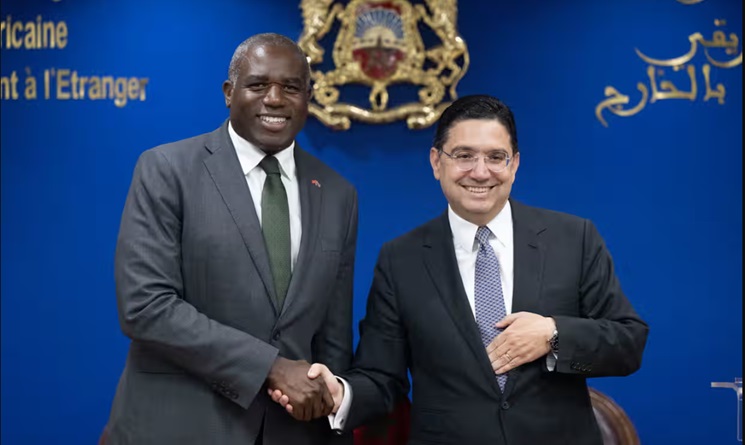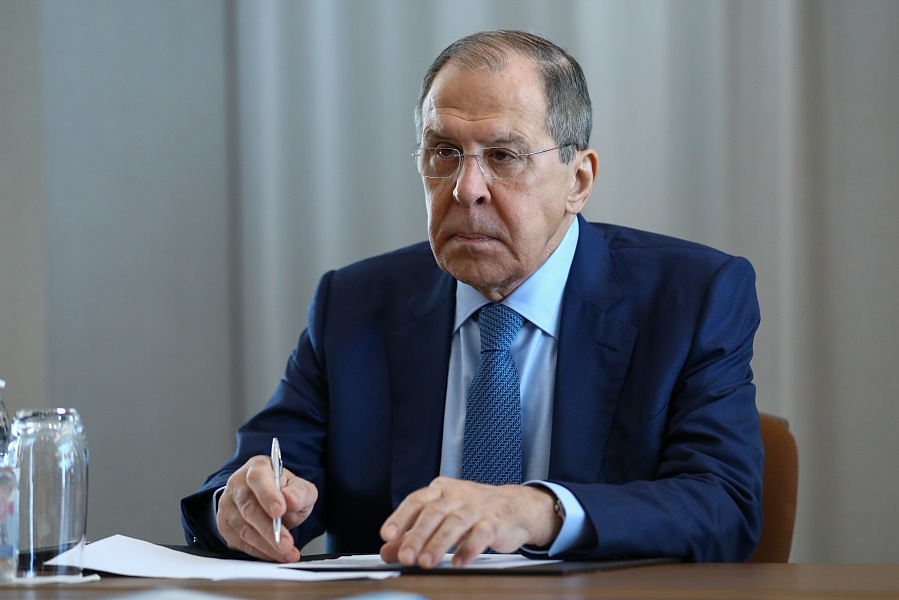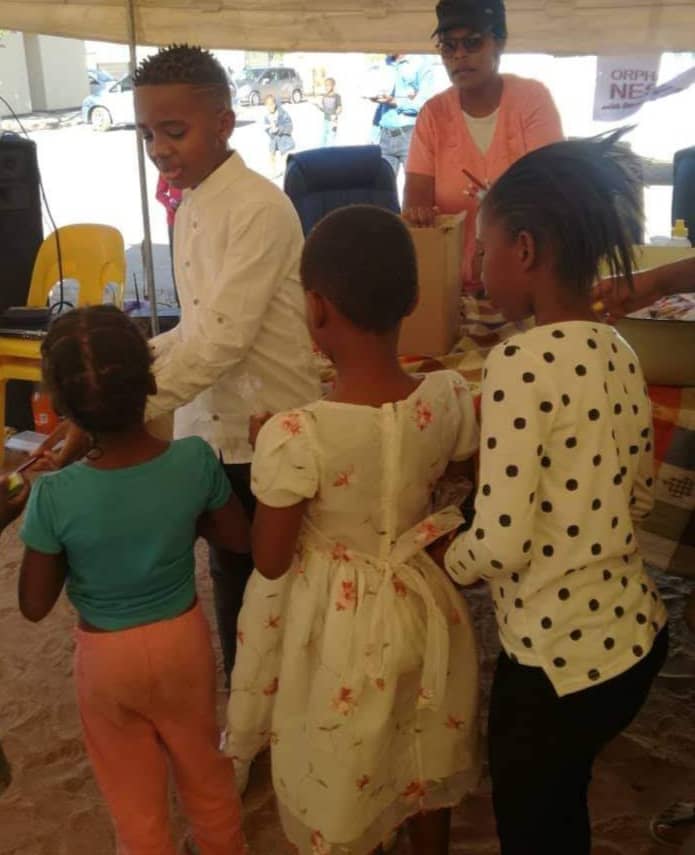
President Vladimir Putin
President of Russia Vladimir Putin: Mr. Assoumani, heads of state and government, high representatives of African countries, ladies and gentlemen,
I would like to begin by welcoming all of you to St Petersburg. Thank you for accepting our invitation and coming here. In Russia, you are among friends and like-minded people.
We have a high-profile line-up of participants in the plenary session of the Economic and Humanitarian Forum. I believe it is symbolic that the Russia-Africa Summit starts its programme with this important event. Its tagline is Technology and Security in the Name of Sovereign Development for the Benefit of Humankind, which is highly topical.

Of course, we will discuss all matters on the financial, trade, investment, educational and social agendas in the context of the rapid ongoing changes around the world in terms of digital technology and information. Improving the wellbeing of our people, improving their living standards and resolving the challenges they face in their everyday lives is our main objective.
I would like to say that many useful and constructive discussions are being held at the forum’s industry-related sessions on energy, logistics, transport, agriculture, finance and healthcare. The participants discuss promising ideas and proposals on new mutually beneficial joint projects, specific practical agreements and commercial contracts.
Africa’s potential is obvious to everyone. For example, the average annual GDP growth on the continent in the past 20 years was 4–4.5 percent, which exceeds the world’s average. Africa’s population is approaching 1.5 billion and is growing faster than anywhere else in the world. It is also notable that the middle class, which creates the principal demand for modern goods and services, is growing faster in Africa than in the majority of other parts of the world.
Russia’s government, business and the public are sincerely interested in further deepening multifaceted trade, investment and humanitarian ties with the continent, which meets the needs of all our countries and promotes stable growth and prosperity. I would like to note that Russia-Africa trade reached 18 billion US dollars last year. It is an obvious result of the Russia–Africa Summit held in Sochi.
I have no doubt that by working together we will be able to increase our trade substantially in the near future. Incidentally, in the first six months of 2023 alone, our export-import transactions with African countries increased by over one third. The structure of our trade looks good as well: machinery, equipment, chemicals and food account for over 50 percent of Russia’s exports to Africa.
We are aware of the importance of uninterrupted supply of food products to African countries. This is vital for their socioeconomic development and for maintaining political stability. This is why we have always given and will continue to give special attention to supplying wheat, barley, corn and other grain crops to our African friends, including as part of humanitarian aid provided under the UN World Food Programme.
Friends, the numbers speak for themselves: last year Russia’s trade with African countries in agricultural products increased by 10 percent to $6.7 billion, and has already demonstrated record growth in January-June of this year by increasing by 60 percent. Russia exported 11.5 million tonnes of grain to Africa in 2022, and almost 10 million tonnes in the first six months of 2023.
All this has been taking place despite the illegal sanctions imposed on our exports, which constitute a serious impediment for exporting Russian food, complicating transport, logistics, insurance and bank transactions.
We are witnessing a paradox. On the one hand, the West seeks to block our grain and fertiliser exports, while accusing us of the current crisis on the global food market. This is outright hypocrisy. We saw this approach in all clarity with the so-called grain deal. Brokered with the participation of the UN Secretariat, it was initially designed to promote global food security, mitigate the threat of hunger and help the poorest countries, including in Africa.
However, in almost a year since this so-called deal was concluded, a total of 32.8 million tonnes were exported from Ukraine, of which over 70 percent ended up in high-income and above-average income countries, including primarily the European Union, while I would like to draw your attention to the fact that countries like Ethiopia, Sudan, Somalia and several others received less than 3 percent of this total, or under 1 million tonnes.
Among other things, the reason Russia agreed to take part in this so-called deal was because it contained commitments to lift the illegitimate obstacles for supplying our grain and fertilisers to the global market. Make no mistake, this is what helping the poorest countries is all about.
However, nothing of what was agreed upon or what we were promised materialised – none of the conditions related to lifting the sanctions against the exports of Russian grain and fertilisers to the global markets have been fulfilled.
Not a single one of them. We even faced obstacles when trying to deliver mineral fertilisers to the poorest countries that need them for free, as we have just discussed during the meeting with the leadership of the African Union.
We managed to send only two shipments – just 20,000 tonnes to Malawi and 34,000 tonnes to Kenya, of the 262,000 tonnes of these fertilisers blocked in European ports. All the rest remained in the hands of the Europeans, even though this initiative was purely humanitarian in nature, which means that it should not have been exposed to any sanctions, as a matter of principle.
Ok, some may not want Russia to enrich itself, as they say, and use its revenue for military aims. Fine. But these were free shipments! But no, they would not let them through, despite all this empty talk about their desire to help the poorest countries.
Considering these facts, we refused to extend this would-be deal. As I have already said, Russia can well fill in the gap left by the withdrawal of the Ukrainian grain from the global market, either by selling its grain or by transferring it for free to the neediest countries in Africa, especially considering that this year we once again expect to have a record-high harvest.
To be more specific, let me say that in the next few months, next three to four months, we will be ready to provide, free of charge, a supply of 25,000–50,000 tonnes of grain each to Burkina Faso, Zimbabwe, Mali, Somalia, the Central African Republic and Eritrea, delivered at no cost.
A few more figures will probably be of interest. Ukraine produced about 55 million tonnes of grain in the past agricultural year. Exports amounted to 47 million tonnes: quite a lot, including 17 million tonnes of wheat. And Russia, colleagues, harvested 156 million tonnes of grain last year. It exported 60 million tonnes, of which 48 million tonnes was wheat.
Russia’s share of the world wheat market is 20 percent, Ukraine’s is less than five per cent. This means that it is Russia that makes a significant contribution to global food security and is a solid, responsible international supplier of agricultural products. And those who claim that this is not the case, that it is only to secure the so-called grain deal to export Ukrainian grain, are simply twisting the facts and telling untruths. As a matter of fact, this has been the practice of some Western countries for decades, if not centuries.
Our country will continue to support states and regions in need, including with its humanitarian supplies. We are seeking to actively participate in the formation of a more equitable system for the distribution of resources and are doing our utmost to prevent a global food crisis.
In principle, we are convinced that with the application of appropriate agricultural technologies and the correct organisation of agricultural production, Africa can in the long term not only feed itself and ensure its own food security, but also become an exporter of various types of food. And Russia will only support you, I assure you.
My colleagues and I were just talking about this yesterday during our bilateral meetings, and my African colleagues told me: we can produce food – we need technology and the appropriate support. For its part, Russia is ready to share its expertise in agricultural production with African countries and to provide assistance in introducing the most advanced technologies.
We are also interested in further developing cooperation with African countries in the energy sector. This interaction is based on vast experience: over many years, Soviet and Russian specialists have been involved in designing and building major power generating facilities in Angola, Egypt, Ethiopia and other countries on the continent, with a total capacity of 4.6 gigawatts and amounting to – I would like to specifically emphasise this, friends – 25 percent of Africa’s hydropower capacity.
Currently, Russian companies are implementing new mutually beneficial projects that aim to meet African economies’ increasing needs for fuel and generating capacities, and provide Africans with access to affordable, reliable, sustainable and eco-friendly sources of energy.
More than 30 ambitious energy projects that involve Russian companies are now underway to varying extent in 16 African countries, with a total capacity of about 3.7 gigawatts. Russia’s RusHydro offers a vast scope of services to African partners, ranging from design and equipment supply to modernisation and construction of new turnkey power generating facilities.
Russian companies Gazprom, Rosneft, LUKOIL and Zarubezhneft are involved in developing oil and gas fields in Algeria, Egypt, Cameroon, Nigeria and the Republic of the Congo. Over the past two years, Russia’s exports of crude oil, petroleum products and liquefied natural gas to Africa have seen a 2.6-fold increase.
Rosatom, our top nuclear energy company, is building El Dabaa Nuclear Power Plant in Egypt. This state corporation can share its unique expertise with African countries, as well as unparalleled technologies in non-energy peaceful use of atom, such as in healthcare and agriculture.
Promoting deeper cooperation between Russia and Africa in manufacturing has special importance. The continent knows Russia for its industrial goods, including cars, construction equipment, and many other products, which enjoy high demand and are known for their quality, reliability, and ease of use. Special service centres in Africa offer maintenance services for Russian equipment and machinery.
We are developing new tools for offering preferential loans to enable Africans to buy our industrial goods, deliver them to the continent, and benefit from after-sales services. The Russian Agency for Export Credit and Investment Insurance is there to provide insurance for these loans. We are devising a leasing mechanism tailored for Africa and are about to establish a dedicated investment fund for co-financing infrastructure projects. In Egypt, as my colleague President Sisi and I discussed yesterday, we are in talks to establish a Russian Industrial Zone near the Suez Canal. I hope that we will be able to launch it soon. We expect the construction of its first manufacturing facilities to begin this year so that the goods made there can be exported across Africa.
As a leader in ICT, Russia seeks to promote deeper cooperation with African countries in information security, AI, and the digital economy. We have positive experience in developing and using information technology solutions for administering taxes, registering property rights, offering e-government services to individuals and entities, including the corporate sector. We can help African countries that are interested in these solutions launch similar systems and reaffirm our unwavering commitment to sharing our know-how for promoting technological development.
In order to expand the range of our trade and economic ties, we should use national currencies, including the ruble, more energetically in the financial settlement of our commercial transactions. In this context we are ready to help African countries develop their financial infrastructure and to connect their banking establishments to the Financial Messaging System created in Russia, which can be used to make cross-border payments independently of some Western systems that are adopting restrictions. This will allow us to enhance the stability, predictability and security of mutual trade.
Russia is actively reorienting its transport and logistics flows to the Global South, including Africa, of course. The North-South transport corridor that we are building is designed to provide Russian products with access to the Persian Gulf and the Indian Ocean, with further connections via the shortest sea route to the African continent, among other regions. Naturally, this corridor can be used in reverse to deliver African goods to Russia.
Connecting the North-South transport corridor with Africa, lunching regular freight lines, which is our goal, and opening a Russian transport and logistics hub in a port on the eastern shore of Africa could be a good start of our cooperation. We consider it extremely important to expand the network of direct flights to Africa and to contribute to the development of the railway network in Africa. These are the most important goals of our time that we invite our African friends to tackle together.
Russia is interested in strengthening its ties with regional economic integration associations and structures in Africa across the board. For example, we support establishing cooperation between the Eurasian Economic Union – a major integration project and Russia is part of it – and the African Continental Free Trade Area within the African Union. We are also ready to share with our African partners our experience in promoting integration between Russian and Belarus within the Union State.
Today, we will have a working lunch with the heads of state and government of countries heading Africa’s main regional organisations, as well as the senior executives of these associations. We want to show our African partners what we have to offer on the key aspects of integration such as removing barriers within a single market, the operation of free trade areas, coordinating agricultural, industrial policies and in other sectors too. I am convinced that this comprehensive cooperation, both in bilateral and multilateral settings, will enable us to expand our economic ties with Africa in terms of both quality and quantity.
I would also like to draw your attention to the fact that bilateral intergovernmental commissions have proven their worth in promoting economic and humanitarian cooperation. However, so far, we have these commissions with only a third of African countries. There are 18 of them for 54 countries. In this context, we suggest that the interested African countries who have yet to join this format should think about working with us to establish these commissions. It goes without saying that we are ready to move in this direction and believe that this would be beneficial.
We are also ready to expand the network of our trade missions in Africa and have more economic advisors, as well as attaches for agriculture, education, research and ICT.
Friends,
We will continue to give priority attention to the development of cultural, scientific, educational, sports and youth exchanges between Russia and African states. There is a great deal our country has to offer in these spheres.
Of course, training of skilled personnel has always been and remains a traditional area of Russia-Africa cooperation. We discussed this issue just now at a meeting with the African Union leaders.
Nearly 35,000 African students are studying at Russian universities, and this number is growing every year. The quota for African students financed from the federal budget has increased by 150 percent over the past three years and will exceed 4,700 people in the next academic year.
We plan to open branches of the leading Russian universities in Africa. Close ties are being developed with African educational institutions within the framework of the Russian-African Network University. An agreement on the establishment of the Russian-African consortium of technical universities, the Subsoil Resources of Africa, was signed at St Petersburg Mining University on July 26, ahead of this forum. It provides for the joint training of professionals for the mineral resources sector. I regard this as an extremely important and interesting area for cooperation.
We will continue to help our African friends develop not only the system of higher education but also general and vocational schools, train teachers, mentors and technical personnel for schools and colleges, as well as establish joint schools for which adapted teaching aids based on a combination of Russian and African national education programmes are being prepared.
We propose considering the possibility of opening schools in Africa with a series of subjects taught in Russian. I am confident that the implementation of projects such as the study of Russian and the introduction of Russia’s high educational standards will create the best foundation for our continued mutually beneficial and equal cooperation.
Next year, an international Russian language organisation should begin operating, which will be open for all countries to join if they like the Russian language and want to use it, as well as like and are interested in Russian culture. We invite our African partners to join in this endeavor.
In 28 African countries, a project has been launched to create open education centres to train teachers and educators of children’s preschool institutions, as well as primary and secondary schools. In order to do this, we are planning to significantly increase the enrollment of African students in Russian pedagogical universities.
More than 10,000 Africans currently studying in Russia are being trained in medical specialties. Healthcare and the fight against epidemics are an important area of Russia-Africa cooperation. Let me remind you that Russia was among the first countries to come to the aid of African countries during the coronavirus pandemic: we sent millions of Russian test kits to African countries free of charge and together with South Africa conducted scientific research on new strains of the dangerous virus.
Just in recent months we handed two Russian mobile laboratories over to our partners from the Democratic Republic of the Congo and continue to equip the Russian-Guinean centre for the study of infections in Kindia, where more than 20 diagnostic products have been developed. About 1,500 local specialists have been trained in Russian infection prevention and control methods. A joint centre has also been established in Burundi to study infections.
A large Russian programme has been developed and will function until 2026 to assist Africa in countering infections, for which 1.2 billion rubles will be allocated. Under this programme, 10 mobile labs will be supplied, hundreds of specialists trained, and joint research carried out.
Every year, Russia and Africa have more and more youth exchanges. Representatives of African countries, as part of the New Generation programme, annually travel to Russia to participate in short-term programmes designed for young representatives of political, public, scientific, and business circles to get acquainted with our country. Relations are also maintained with those Africans who were educated in Russia. Just now, during my previous meeting, I had the pleasure to Communicate with colleagues who speak fluent Russian.
I would like to use this occasion to invite our young African friends to come to Russia in March 2024, when the World Youth Festival will be held in Sochi. It’s a major forum that will bring together young people from all over the world. We expect over 20,000 participants from more than 180 countries.
We set a high value on cooperation in physical fitness and sport. We are ready to further develop ties with African countries’ sports federations. We propose building up ties between the sports universities of Russia and Africa, exchanging university students, implementing volunteer programmes and holding joint matches in different sports between educational institutions and universities.
We invite African athletes to take part in the University International Sports Festival, which will be held in August in Yekaterinburg, in the Urals, and in the Games of the Future, which Kazan will host in February and March 2024. These games are a unique combination of dynamic sports and the most popular video games and technological devices. This new competition format combines classical and innovative sports.
Russia is resolved to develop cooperation with African countries and Africa as a whole in the sphere of mass communications, including the exchange of content, organisation of training courses for media personnel and students, and organisation of experimental events.
Work is underway to open offices of the leading Russian media outlets in Africa, including the TASS News Agency, Rossiya Segodnya, RT, VGTRK and Rossiyskaya Gazeta. We propose creating a common information space of Russia and Africa, where Russian and African audiences will have access to objective and unbiased information about world events.
In conclusion, I would like to emphasise that Russia is sincerely interested in continuing to promote all-round development and deepen trade, economic and humanitarian cooperation with all African countries. I have no doubt that this forum and the thematic meetings, round tables and talks held within its framework will certainly be useful and will bring us closer to our common goals.
Thank you very much for your patience and attention. Thank you.
Irina Abramova: Thank you very much, Mr President.
Your speech has clearly set the prospects, nature and main areas of Russian-African cooperation in today’s transforming world order.
I believe the participants in our forum have received answers to the most pressing questions that concern both Russia and Africa today. Cooperation between equal and sovereign states is always a two-way road, and it is always extremely important for Russians to know the opinion of our African partners on the developments in the world and the prospects for cooperation.
I am honoured to give the floor to Chairperson of the African Union, President of the Union of the Comoros, His Excellency Mr Assoumani.
Chairperson of the African Union, President of the Union of the Comoros Azali Assoumani (retranslated): Your Excellency, President of the Russian Federation, Mr Putin.
Your Excellencies, presidents of the African Union member countries,
Mr Moussa Faki Mahamat, Chairperson of the African Union Commission,
Representatives of the Russian authorities and the city of St Petersburg, ladies and gentlemen,
It is a great honour for me to pass greetings from the African Union to the second Russia–Africa summit in St Petersburg. I am very pleased to have an opportunity to speak today on behalf of our organisation on some matters that are important for Africa, as well as discuss our partnership with Russia, a global power that has an active presence on our continent.
First of all, let me thank the authorities of the Russian Federation for the warm welcome in the magnificent city of St Petersburg and for organising this event, both personally and on behalf of the African Union. We are in the Northern Venice: this beautiful city shows how great the Russian genius and creator of this city, Peter the Great, was. Today, the second Russia-Africa summit is taking place here, and we are talking about our common history.
Your Excellency, ladies and gentlemen,
The multipolar world of the 21st century cannot close on itself. That is why Africa wants to establish a fair and mutually beneficial partnership with the entire world. In particular, economically, Africa, where 3.8 billion people will live by the end of the century, wants to work closely with more partners, both bilaterally and multilaterally. Given the abundance of our human and natural resources, the dynamics of our continent, the workforce that we have, we look forward to close cooperation.
It Is clear to us that Russia has a special place in our partnership and we are ready to work in cooperation with Russia on all major topics.
- Also taking part in the session were Chairperson of the African Union and President of the Union of the Comoros Azali Assoumani, Patriarch Kirill of Moscow and All Russia, President and Chairman of the Board of Directors of the African Export–Import Bank Benedict Oramah, and President of the New Development Bank Dilma Rousseff. Director of the Russian Academy of Sciences Institute for African Studies Irina Abramova moderated the discussion.









